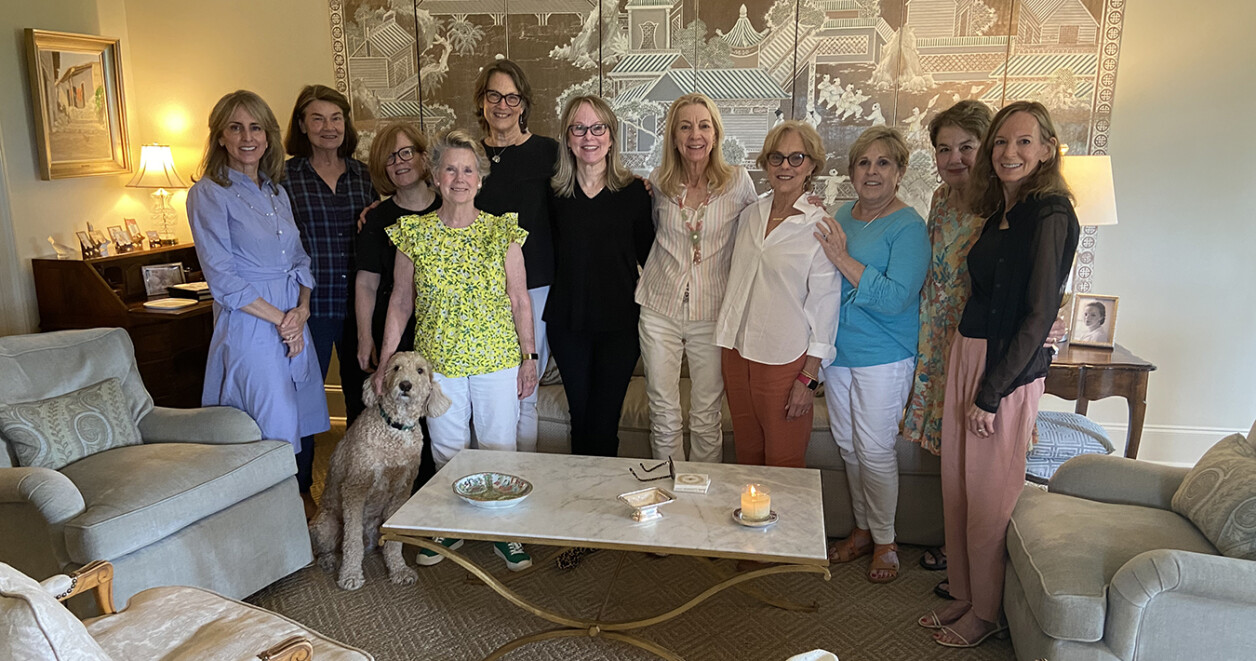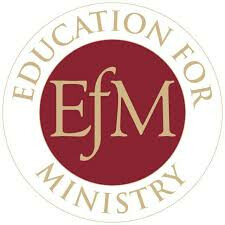

Education for Ministry (EfM) is a unique four-year distance learning certificate program in theological education based upon small-group study and practice, from the Sewanee School of Theology. EfM helps the faithful encounter the breadth and depth of the Christian tradition and bring it into conversation with their experiences of the world as they study, worship, and engage in theological reflection together. Recent EfM graduates, Valeria Emmett (VE), Melissa Fanning (MF), Beverly Lamb (BL), Vicki Moran (VM), and Katie Rafferty (KR) share their experiences below.
What initially inspired you to enroll in EfM?
VE: I have been interested in EfM since my parents did it in the beginning of the program. They felt very inspired by it.
MF: I joined EfM because I really wanted more formal education about Christian theology and, having recently retired, I felt that I finally had the time for study.
BL: I have taken many spiritual education classes at Trinity and have loved them all; especially Disciples of Christ in Community (DOCC), Alpha and Stephen Ministries. EfM came highly recommended to me by several friends. The 4-year class intrigued me, but I couldn’t fit in into my work schedule. When I retired in the spring of 2017, EfM was being offered and I signed right up!
VM: I joined EfM because I wanted to learn more about my faith, my church and an opportunity to find answers I have regarding my faith and my journey in Christ’s path.
KR: After the death of several people close to me I found myself in a tug-of-war with my childhood faith practices and knew that I needed a “booster shot” of some kind. It was almost immediately upon praying for said “booster shot” that Maria’s email arrived announcing the EfM class. I also really wanted to study the Bible from start to finish and knew that I needed some kind of structured program in order to do that.
What was the most rewarding?
VE: I've gained a greater understanding of my faith and the faith of others.
MF: The sisterhood with the other participants and the mentors. Some of the “interlude” books were very impressive and directly related to life, such as The Sabbath. The tome of the third year, A History of Christianity: The First Three Thousand Years was very broad and is a great reference book. I also adored our trip to the City Park labyrinth.
BL: Taking EfM was life changing! Besides the magnitude of knowledge, we read about people all over the world “believing in a higher power” for centuries. Studying many religions, I now understand more clearly how people select their spiritual path. Christianity is not the only answer. One of the best parts of our class was the safe and confidential class time where we shared personal stories. The friendships and close bonds created by our class are a treasure.
VM: The most rewarding for me was feeling accepted into this community and to grow with a wonderful group of women.
KR: Without a doubt the most rewarding part of EfM is the community of participants. Melissa said “sisterhood”; that is exactly what it is. Our leaders, Maria and Christina were able to guide us through the COVID pandemic via Zoom, which was especially wonderful. I found myself eagerly looking forward to Monday mornings. On top of that, I really enjoyed the readings. There were a couple of interim books that were wonderful. One of them was The Sabbath. I loved all of the book suggestions from the group that were part of our regular discussions. Maria and Christina kindly recorded the titles and sent them to us in weekly emails.
What was the most challenging?
VE: It was most challenging to read the Old Testament.
MF: The book about a feminist approach to theology, A History of Christianity: The First Three Thousand Years, and the theological reflections.
BL: Having the self-discipline to do my assignment on Sunday to be ready for my Monday class (during a Saints game!)
VM: The 3rd year work where we read A History of Christianity: The First Three Thousand Years. The book was challenging, yet there were portions of the book that I delighted in. Interestingly, I recently watched a documentary on the life of Paul. In the journey that was explained, I understood and absorbed many of the comments the professor offered as he walked and discovered many tombs, synagogues, roads to Rome, Torah and more that reminded me of those days of multi-pages. In other words, I am still on my journey, but I do understand more of it!
KR: I found it challenging to read the Old Testament, as well as keeping my mouth closed, ears open and sitting still for 2.5 hours.
What surprised you?
VE: I was surprised at the amount of outside influences on the Church.
MF: I was surprised to find out the Old Testament was compiled by different groups of authors.
VM: What surprised me was the ancillary books we read in each year. We read from books that informed us of so many faiths and I came to know that our faith as Christians is combined with many others. We read Islamic books, The Sabbath (my favorite), Dream of God, the Hebrew Bible, and so many more. The discussions around these books opened my eyes to other faiths.
KR: What surprised me the most about EfM was how much I enjoyed the Theological Reflections. It is NOT an easy process but we all got much better at it as we worked through it. We all bring unique responses to the group process.
What has changed for you?
VE: EfM has made me a much more curious reader.
MF: I feel much more confident in my knowledge of the Bible and equipped for reflecting on life experiences.
BL: I understand more clearly about other religions. Personally, with my sisterhood, I learned to trust sharing my stories and feelings.
VM: I have a much deeper understanding of Christianity and how I practice it.
KR: Wow-loaded question: Let’s just say that the needed “booster shot” gave me so much more spiritual energy than I had before I went to EfM. I have always enjoyed the study of religion (except when I was little sitting in religion class) but this course was beyond anything I could have imagined. It was not just a dry course on theology. This course really made the scriptures relevant to our modern life. As we slogged through 2020 and other very trying times in the last four years, I was better able to put things into perspective. We did it as a community, under the able guidance of Maria and Christina.
What will you treasure?
VE: I will treasure my friendships that I formed during EfM.
MF: I will treasure the friendships that have been made or strengthened, and the four years of learning.
BL: The love and friendships. Plus, what I learned about myself. I also now have a spectacular spiritual library. Thank you to the Theology Department at the University of the South!
VM: I’ll treasure Monday mornings and my EfM Group and Mentors.
KR: I will particularly treasure the new friends. I am forever grateful for the renewed spiritual energy and for the talents each person receives and shares in community. Being a part of Trinity’s community via EfM has been a godsend. I love the vitality.
What advice would you give to others who are beginning? Why should they participate?
BL: “Jump in with both feet” and don’t be afraid of the Old Testament. Yes, take EfM- - - it will change your life.
VM: My advice to new participants — keep your mind open, learn a process of how you will prepare each week, and if it’s too difficult - listen. Don’t be overwhelmed. Participation keeps you connected with your group and provides more understanding for everyone.
KR: My advice is to read FIRST the last part of the Reader’s Guide (the part that suggests HOW to read the Old Testament). My other bit of advice is to not wait until Sunday to do all of the reading. The Sabbath is supposed to be a day of rest. For auditory learners, the Bible is on Audible (so is A History of Christianity: The First Three Thousand Years). Do not be put off by the amount of reading. It is so rewarding. EfM will add a whole new dimension, and a whole new group of friends, to your life. It is a gift - given through others- that’s the sign of the Holy Spirit at work.
How will you use your EfM experience?
VE: I will use the skills I learned through theological reflection to look at things from a variety of viewpoints.
MF: A major part of the fourth year is discovering your personal ministry. My studies confirmed my faith in God, and helped me realize that I, like everyone, have something unique to offer.
BL: Taking EfM during the pandemic and even the Zoom classes brought us all closer as friends and comrades. I will use this experience as a “role model” in my daily life. The love and respect that I now have for other religions makes me wonder, at times, if I would have chosen Christianity if I had been exposed to different faiths at an earlier age.
VM: I will use my EfM experience to find my personal next step into ministry. And, of course, maintaining my wonderful relationships from our loving EfM team.
KR: I am an artist who uses “metaphor” on a daily basis. The practice of metaphor making and thinking abstractly is hard. It takes patience, and practice, but EfM provides the tools to do that. I am forever grateful for this experience.


